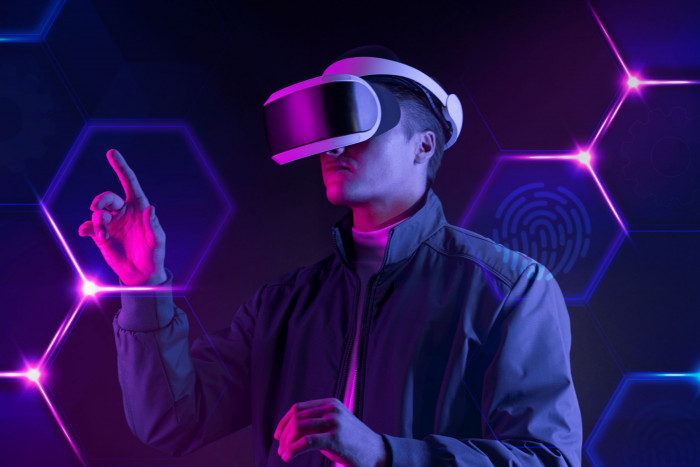The digital era brings with it a series of technological innovations that have transformed the way we interact with the world. Among these innovations, we highlight virtual reality (VR), augmented reality (AR) and extended reality (XR). These technologies have applications that range from entertainment to education, health, and much more. If you are interested in becoming a developer in these areas, here are some ways to follow and develop as a professional.
1. Understand the basic concepts
Before delving into any area, it is essential to understand the basic concepts.
- Virtual Reality (VR): It creates a totally immersive digital environment, where the user is placed in a virtual world separate from physical reality.
- Augmented Reality (AR): It superimposes digital elements into the real world, enriching the user experience without removing the physical environment.
- Extended Reality (XR): It is a term that encompasses VR, AR and other emerging technologies that combine real and virtual.
Understanding these definitions and differences is crucial to choosing the area you are most interested in and where you want to focus.
2. Understand or role two metaverses
- Metaverses: There are persistent, shared and interactive virtual worlds where users can meet, interact, work, play and even raise themselves. These environments are becoming an important part of VR and XR technology, offering new opportunities for developers.
- Roblox: A popular example of a metaverse is Roblox, an online gaming platform that allows users to create and play games created by other users. Roblox has grown exponentially as a space where young developers can learn to program and create interactive experiences, using a Lua-based scripting language. Developers who want to work with VR and XR can use Roblox as a testing ground to create immersive experiences that can be played by thousands of users around the world.
- Metaverse of Meta (Facebook): Meta, formerly known as Facebook, is investing heavily in developing its own metaverse. This metaverse aims to be a digital space where people can socialize, work, raise and learn in a totally immersive environment, using VR and AR technologies. A Meta is developing a variety of tools to create and interact within this space, which offers an excellent opportunity for developers who specialize in creating content and experiences for these new digital worlds.
- Other metaverses: Besides Roblox and Meta, there are other examples you will notice how or Decentraland, a decentralized virtual world built on the Ethereum blockchain, where users can buy, sell and develop virtual land; eo VRChat, which is a virtual reality social space focused on allowing users to create and personalize avatars and environments, promoting an active and vibrant community.
Understanding the functioning of these metaverses and the technologies behind them is essential for any developer who wants to stand out in the field of VR and XR. They represent not only a new form of entertainment, but also a new frontier for remote work, education, commerce and much more.
3. Acquire fundamental technical skills
Developing applications for VR, AR and XR requires a solid set of technical skills. Here are some areas where you should focus:
- Programming: Languages such as C#, C++, Python and JavaScript are widely used in the development of virtual and augmented reality. The knowledge of these languages will allow you to create scripts and interact with VR and AR APIs.
- Game engines: Platforms like Unity and Unreal Engine are essential tools for the development of VR and AR experiences. Both support the creation of three-dimensional environments and integrated resources for VR and AR.
- Unity: Unity is one of the most popular platforms for VR and AR development due to its flexibility and open support for various platforms. With Unity, you can create immersive three-dimensional environments, complex interactions and realistic experiences for a wide range of devices, from VR headsets like Oculus Rift and HTC Vive to mobile devices for AR experiences with ARKit (iOS) and ARCore (Android).
- Breeding for VR with Unity: To develop for VR without Unity, you need to configure your project for VR, add or support the SDK of your specific device (such as Oculus, SteamVR, etc.), and use VR components provided by Unity, such as VR cameras and controllers. Unity makes it easy to create virtual worlds with its intuitive interface and robust development features, such as a dinner editor, physics tools, and spatial audio support, which are essential for creating an immersive VR experience.
- Breeding for AR with Unity: Developing for AR in Unity involves the use of frameworks such as AR Foundation, which allows the creation of cross-platform AR applications. The AR Foundation offers a common API for specific AR functionalities, such as image tracking, plane detection, and occlusion, facilitating development for ARKit and ARCore. With Unity, you can design AR experiences that seamlessly integrate digital objects into the real world, providing rich and interactive experiences for users.
- 3D Design: Knowing how to use 3D modeling software such as Blender, Maya or 3ds Max is important, because many VR and AR applications require detailed three-dimensional models.
- Development of mobile applications: Development knowledge for iOS and Android is essential, especially for AR, which is frequently used on mobile devices.
4. Escolha uma especialção
With so many possibilities, it is advantageous to choose an area of specialization within VR, AR or XR:
- Game development: focus on creating interactive experiences and immersive games.
- Corporate applications: create solutions for training, simulation, product design and collaboration.
- Educational experiences: develop educational content that uses VR and AR to provide immersive learning.
- Health and therapy: Work on applications that help in rehabilitation or exposure therapies to treat phobias.
Choosing a specialization will help direct your learner to develop specific skills that differentiate the market.
5. Learn with practical projects
Theory is important, but practice is essential. Start by creating your own projects, no matter how simple they may be. Building small prototypes and iterating based on feedback will help you better understand the tools and user needs.
- Hackathons and contests: Participating in hackathons and competitions focused on VR, AR and XR is an excellent way to gain practical experience, collaborate with other professionals and expand your portfolio.
- Tutorials and online courses: There are countless courses and tutorials available online that range from basic to advanced topics. Platforms like Coursera, Udemy, and YouTube offer us valuable resources.
6. Networking and communities
Connecting with other professionals is crucial for your development. Participate in online communities, forums, and social networking groups dedicated to VR, AR, and XR. Participating in conferences, technology fairs and workshops is also an excellent way to learn about the latest trends and technologies, as well as learn about other professionals in the area.
7. Keep up-to-date with trends
VR, AR and XR technology is constantly evolving. Keeping up-to-date with the latest innovations and trends is essential to stay relevant in the field. I read blogs, specialized magazines, and attended lectures and webinars. Also, accompany the updates of development platforms and APIs, such as ARKit, ARCore, and Oculus SDK, to always be up to date with the new functionalities and capabilities.
8. Build a robust portfolio
A robust portfolio is vital for showcasing your skills to potential employers or clients. It included projects that demonstrated its ability to create immersive and interactive experiences. Make sure you highlight not only the results, but also the development process, the challenges overcome, and the innovative solutions that you created.
Becoming a professional in VR, AR and XR is a challenging and challenging path. By focusing on acquiring technical skills, understanding the role of two metaverses, mastering tools such as Unity, pursuing a specialization, learning with practical projects, connecting with the community and keeping up-to-date with trends, you will be best positioned to succeed in this rapidly evolving area. With continued dedication and curiosity, you will be able to create innovative and impactful experiences that will define the future of digital interaction.
Talk to me Software.com.br and learn more together with a specialist, through the e-mail consultaria@software.com.br.
See more on the blog Software.com.br.









 8 min reading
8 min reading




